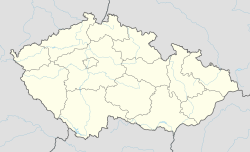Havířov
| Havířov | |||
|---|---|---|---|

Part of town square
|
|||
|
|||
| Location in the Czech Republic | |||
| Coordinates: 49°46′59″N 18°25′22″E / 49.78306°N 18.42278°ECoordinates: 49°46′59″N 18°25′22″E / 49.78306°N 18.42278°E | |||
| Country | Czech Republic | ||
| Region | Moravian-Silesian | ||
| District | Karviná | ||
| Founded | 1955 | ||
| City parts |
8
|
||
| Government | |||
| • Mayor | Daniel Pawlas | ||
| Area | |||
| • Total | 32.07 km2 (12.38 sq mi) | ||
| Elevation | 260 m (850 ft) | ||
| Population (1 January 2015) | |||
| • Total | 75 049 | ||
| Postal code | 736 01 | ||
| Website | http://www.havirov-city.cz/ | ||
Havířov (Czech pronunciation: [ˈɦaviːr̝of]; Polish: Hawierzów , Cieszyn Silesian: Hawiyrzów ) is a city in the Karviná District, Moravian-Silesian Region of the Czech Republic. It has 77,449 inhabitants, making it the second-largest city in the region. It is the largest town in the country without a university. Havířov lies in the historical region of Cieszyn Silesia.
Havířov was founded after World War II (thus being the youngest city in today's Czech Republic) as a coal mining town. Havířov officially became a town in 1955. It was built on top of several villages with significant Polish populations. The local people were given apartments in the newly built city, and most of their old houses were demolished to make room for new urban buildings. The majority of the population of Havířov emigrated from other parts of Czechoslovakia, many of them from Slovakia, as migrant workers, thus substantially altering the ethnic structure of the area. Today, the original villages are administratively part of the city and mostly lie on the outskirts of urban Havířov. It was to have been named Čestprácov, but it was deemed not the best name for the city, so it was named Havířov.
Havířov was founded after the Second World War. Most of the buildings of the new city were built in the style of Socialist realism. In the 1960s there was built a new train station in the so-called Brussels style (Czechoslovak avant-garde artistic movement), which is probably the best-known city monument.
...
Wikipedia



